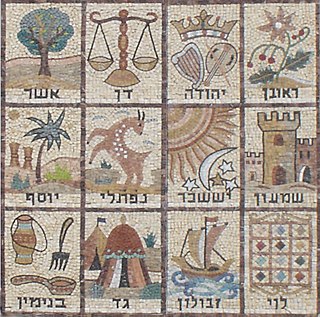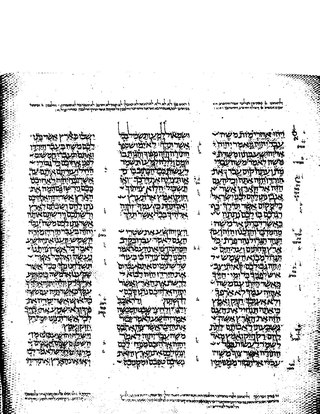Related Research Articles

The Book of Joshua is the sixth book in the Hebrew Bible and the Old Testament, and is the first book of the Deuteronomistic history, the story of Israel from the conquest of Canaan to the Babylonian exile. It tells of the campaigns of the Israelites in central, southern and northern Canaan, the destruction of their enemies, and the division of the land among the Twelve Tribes, framed by two set-piece speeches, the first by God commanding the conquest of the land, and, at the end, the second by Joshua warning of the need for faithful observance of the Law (torah) revealed to Moses.
The Book of Kings is a book in the Hebrew Bible, found as two books in the Old Testament of the Christian Bible. It concludes the Deuteronomistic history, a history of ancient Israel also including the books of Joshua, Judges, and Samuel.

Deuteronomy is the fifth book of the Torah, where it is called Devarim and the fifth book of the Hebrew Bible and Christian Old Testament.

According to the Hebrew Bible, the tabernacle, also known as the Tent of the Congregation, was the portable earthly dwelling of God used by the Israelites from the Exodus until the conquest of Canaan. Moses was instructed at Mount Sinai to construct and transport the tabernacle with the Israelites on their journey through the wilderness and their subsequent conquest of the Promised Land. After 440 years, Solomon's Temple in Jerusalem superseded it as the dwelling-place of God.

Josiah or Yoshiyahu was the 16th King of Judah. According to the Hebrew Bible, he instituted major religious reforms by removing official worship of gods other than Yahweh. Until the 1990s, the biblical description of Josiah’s reforms were usually considered to be more or less accurate, but that is now heavily debated. According to the Bible, Josiah became king of the Kingdom of Judah at the age of eight, after the assassination of his father, King Amon and reigned for 31 years, from 641/640 to 610/609 BCE.

The Law of Moses, also called the Mosaic Law, is the law said to have been revealed to Moses by God. The term primarily refers to the Torah or the first five books of the Hebrew Bible.

Mount Gerizim is one of two mountains in the immediate vicinity of the Palestinian city of Nablus and the biblical city of Shechem. It forms the southern side of the valley in which Nablus is situated, the northern side being formed by Mount Ebal. The mountain is one of the highest peaks in the West Bank and rises to 881 m (2,890 ft) above sea level, 70 m (230 ft) lower than Mount Ebal. The mountain is particularly steep on the northern side, is sparsely covered at the top with shrubbery, and lower down there is a spring with a high yield of fresh water. For the Samaritan people, most of whom live around it, Mount Gerizim is considered the holiest place on Earth.
High places are simple hilltop installations with instruments of religion: platforms, altars, standing stones, and cairns are common. Along with open courtyard shrines and sacred trees or groves, they were some of the most often-seen public places of piety in the ancient Near East. They appear in the early Bronze Age at the latest.

An Asherah pole is a sacred tree or pole that stood near Canaanite religious locations to honor the goddess Asherah. The relation of the literary references to an asherah and archaeological finds of Judaean pillar-figurines has engendered a literature of debate.

The Twelve Tribes of Israel are, according to Hebrew scriptures, the descendants of the biblical patriarch Jacob, who collectively form the Israelite nation. The tribes were through his twelve sons through his wives, Leah and Rachel, and his concubines, Bilhah and Zilpah. In modern scholarship, there is skepticism as to whether there ever were twelve Israelite tribes, with the use of the number 12 thought more likely to signify a symbolic tradition as part of a national founding myth, although some scholars disagree with this view.

1 Kings 18 is the eighteenth chapter of the Books of Kings in the Hebrew Bible or the First Book of Kings in the Old Testament of the Christian Bible. The book is a compilation of various annals recording the acts of the kings of Israel and Judah by a Deuteronomic compiler in the seventh century BCE, with a supplement added in the sixth century BCE. This chapter belongs to the section comprising 1 Kings 16:15 to 2 Kings 8:29 which documents the period of Omri's dynasty. The focus of this chapter is the activity of prophet Elijah during the reign of king Ahab in the northern kingdom.

Joshua 24 is the twenty-fourth chapter of the Book of Joshua in the Hebrew Bible or in the Old Testament of the Christian Bible. According to Jewish tradition the book was attributed to Joshua, with additions by the high priests Eleazar and Phinehas, but modern scholars view it as part of the Deuteronomistic History, which spans the books of Deuteronomy to 2 Kings, attributed to nationalistic and devotedly Yahwistic writers during the time of the reformer Judean king Josiah in 7th century BCE. This chapter records Joshua's final address to the people of Israel, that ends with a renewal of the covenant with YHWH, and the appendices of the book, a part of a section comprising Joshua 22:1–24:33 about the Israelites preparing for life in the land of Canaan.

Joshua 1 is the first chapter of the Book of Joshua in the Hebrew Bible or in the Old Testament of the Christian Bible. According to Jewish tradition the book was attributed to Joshua, with additions by the high priests Eleazar and Phinehas, but modern scholars view it as part of the Deuteronomistic History, which spans the books of Deuteronomy to 2 Kings, attributed to nationalistic and devotedly Yahwistic writers during the time of the reformer Judean king Josiah in 7th century BCE. This chapter focuses on the commission of Joshua as the leader of Israel after the death of Moses, a part of a section comprising Joshua 1:1–5:12 about the entry to the land of Canaan.

Joshua 22 is the twenty-second chapter of the Book of Joshua in the Hebrew Bible or in the Old Testament of the Christian Bible. According to Jewish tradition the book was attributed to Joshua, with additions by the high priests Eleazar and Phinehas, but modern scholars view it as part of the Deuteronomistic History, which spans the books of Deuteronomy to 2 Kings, attributed to nationalistic and devotedly Yahwistic writers during the time of the reformer Judean king Josiah in 7th century BCE. This chapter records the mediation for the issue of the establishment of an altar on the east back of Jordan River, a part of a section comprising Joshua 22:1–24:33 about the Israelites preparing for life in the land of Canaan.
War in the Hebrew Bible concerns any military engagement narrated or discussed in the Hebrew Bible, also known as the Tanakh or Old Testament of the Bible. Texts about war in the Hebrew Bible are part of the broader topic of The Bible and violence. They cover a wide range of topics from detailed battle reports including weapons and tactics used, numbers of combatants involved, and casualties experienced, to discussions of motives and justifications for war, the sacred and secular aspects of war, descriptions and considerations of what in the modern era would be considered war crimes, such as genocide or wartime sexual violence, and reflections on wars that have happened, or predictions, visions or imaginations of wars that are yet to come.

Joshua 4 is the fourth chapter of the Book of Joshua in the Hebrew Bible or in the Old Testament of the Christian Bible. According to Jewish tradition the book was attributed to Joshua, with additions by the high priests Eleazar and Phinehas, but modern scholars view it as part of the Deuteronomistic History, which spans the books of Deuteronomy to 2 Kings, attributed to nationalistic and devotedly Yahwistic writers during the time of the reformer Judean king Josiah in 7th century BCE. This chapter focuses on the Israelites crossing the Jordan River westward into the land of Canaan under the leadership of Joshua, a part of a section comprising Joshua 1:1–5:12 about the entry to the land of Canaan.

Joshua 8 is the eighth chapter of the Book of Joshua in the Hebrew Bible or in the Old Testament of the Christian Bible. According to Jewish tradition the book was attributed to Joshua, with additions by the high priests Eleazar and Phinehas, but modern scholars view it as part of the Deuteronomistic History, which spans the books of Deuteronomy to 2 Kings, attributed to nationalistic and devotedly Yahwistic writers during the time of the reformer Judean king Josiah in 7th century BCE. This chapter focuses on the conquest of Ai under the leadership of Joshua and the renewal of covenant on Mounts Ebal and Gerizim, a part of a section comprising Joshua 5:13–12:24 about the conquest of Canaan.

Joshua 18 is the eighteenth chapter of the Book of Joshua in the Hebrew Bible or in the Old Testament of the Christian Bible. According to Jewish tradition the book was attributed to Joshua, with additions by the high priests Eleazar and Phinehas, but modern scholars view it as part of the Deuteronomistic History, which spans the books of Deuteronomy to 2 Kings, attributed to nationalistic and devotedly Yahwistic writers during the time of the reformer Judean king Josiah in 7th century BCE. This chapter records the further allotment of land for the tribes of Israel, especially the tribe of Benjamin, a part of a section comprising Joshua 13:1–21:45 about the Israelites allotting the land of Canaan.

Joshua 23 is the twenty-third chapter of the Book of Joshua in the Hebrew Bible or in the Old Testament of the Christian Bible. According to Jewish tradition the book was attributed to Joshua, with additions by the high priests Eleazar and Phinehas, but modern scholars view it as part of the Deuteronomistic History, which spans the books of Deuteronomy to 2 Kings, attributed to nationalistic and devotedly Yahwistic writers during the time of the reformer Judean king Josiah in 7th century BCE. This chapter records the Joshua's farewell address to tribes of Israel, a part of a section comprising Joshua 22:1–24:33 about the Israelites preparing for life in the land of Canaan.